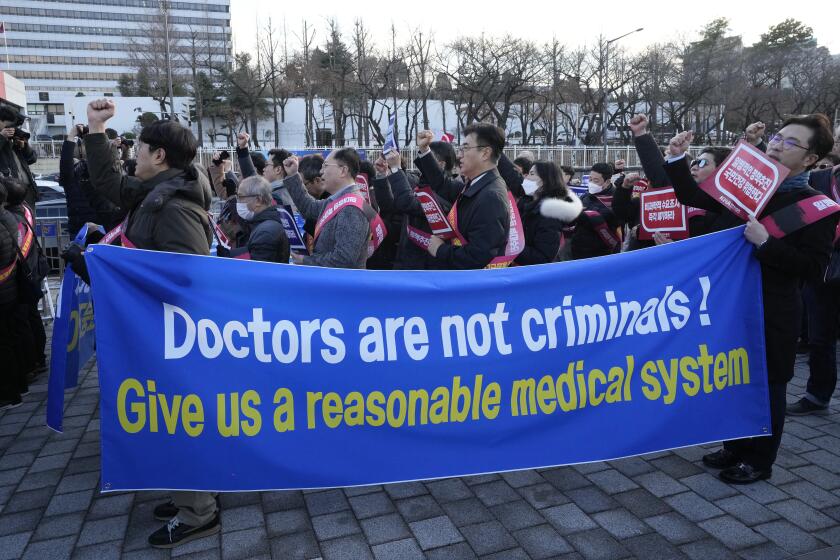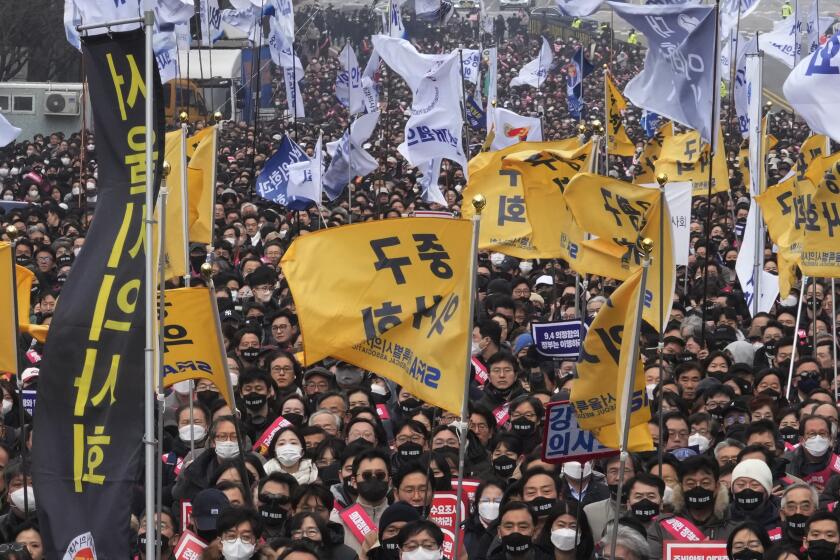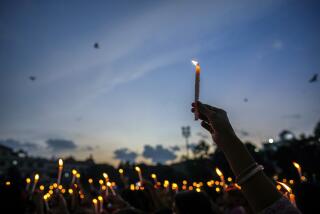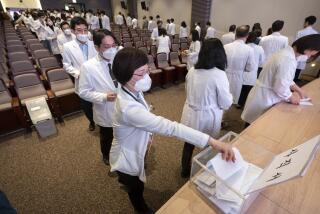Senior doctors in South Korea submit resignations, deepening dispute over medical school plan
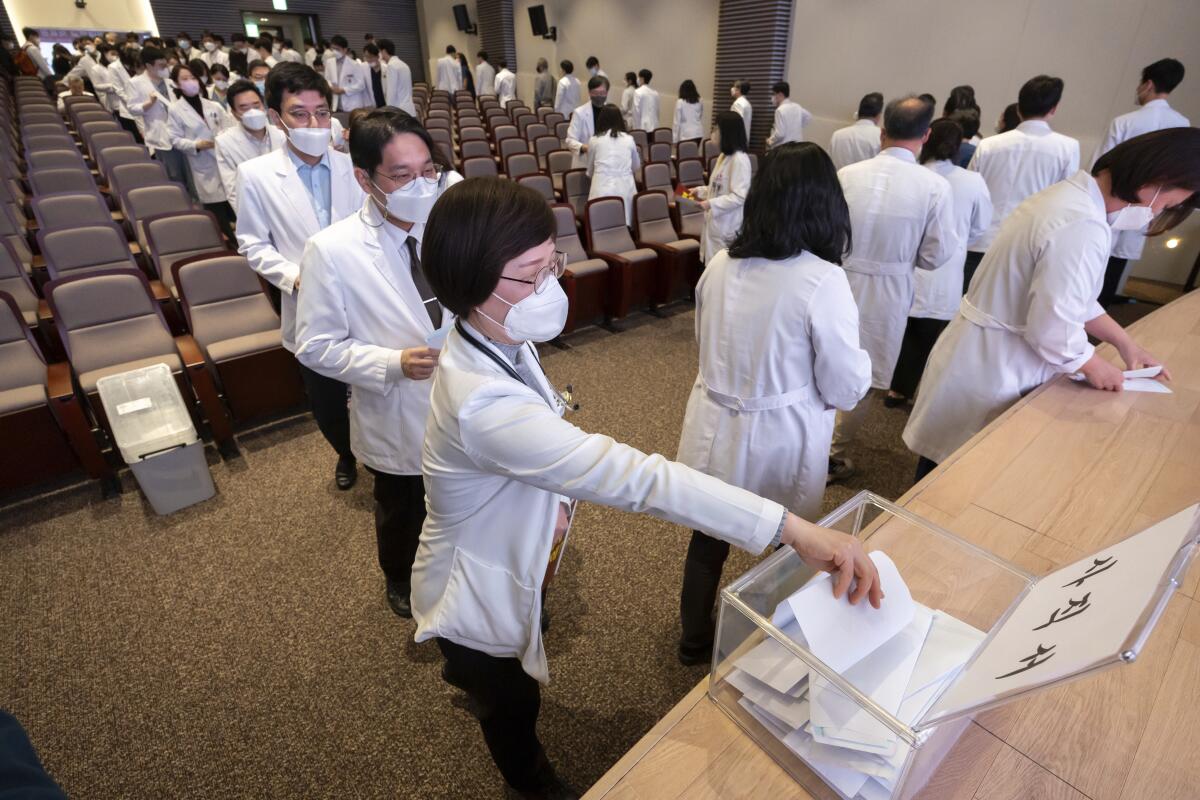
- Share via
SEOUL — Senior doctors at major hospitals in South Korea began submitting their resignations en masse on Monday in support of medical interns and residents who have been on strike for five weeks over the government’s push to sharply increase medical school admissions.
The senior doctors’ action isn’t likely to cause an immediate worsening of hospital operations in South Korea because they have said they would continue to work even after submitting their resignations. But prospects for an early end to the medical impasse were dim, as the doctors’ resignation submissions came after President Yoon Suk-yeol called for talks with doctors while suggesting a possible softening of punitive steps against the striking junior doctors.
About 12,000 interns and medical residents have faced impending suspensions of their licenses over their refusal to end their strikes, which have caused hundreds of canceled surgeries and other treatments at their hospitals.
They oppose the government’s plan to increase the country’s medical school admission cap by two-thirds, saying schools can’t handle such a steep increase in students and that it would eventually hurt South Korea’s medical services. But officials say more doctors are urgently needed because South Korea has a rapidly aging population and its doctor-to-population ratio is one of the lowest in the developed world.
Junior doctors in South Korea are striking to protest the government recruiting more medical students to cope with the country’s fast-aging population.
In a meeting with governing party leader Han Dong-hoon on Sunday, representatives of medical professors and doctors at some 40 university hospitals — where the junior doctors worked while training — expressed support for the striking doctors, saying the government’s recruitment plan “would collapse our country’s medical system,” Kim Chang-soo, head of the emergency committee at those universities, said Monday.
Kim called Yoon’s overture a positive step but said the current standoff between doctors and the government won’t be resolved unless the government rolls back its recruitment plan.
He said doctors at the universities were expected to stick to earlier plans to submit resignations voluntarily and cut back their working hours to 52 hours per week — the maximum weekly number of legal working hours. Observers say senior doctors have been grappling with excessive workloads after their juniors left their hospitals.
“If the government has an intention of withdrawing its plan or has an intention of considering it, we’re ready to discuss all pending issues with the government before the public,” Kim said.
Later Monday, an unspecified number of senior doctors went ahead and handed in their resignations, according to doctors involved in the protests. They said some doctors had already submitted resignations last week.
After Sunday’s meeting, Han asked Yoon’s office to “flexibly handle” the issue of planned license suspensions for the striking doctors. Yoon then asked his prime minister to pursue “a flexible measure” to resolve the dispute and seek constructive consultations with doctors, according to Yoon’s office.
Thousands of striking junior doctors in South Korea are facing proceedings to suspend their medical licenses.
It’s unclear whether and how soon the government and doctors would sit down for talks and reach a breakthrough. Some observers say the government’s likely softening of punishments for the striking doctors and its pursuit of dialogue with doctors were likely related to next month’s parliamentary elections as further disruptions of hospital operations would be unhelpful for ruling party candidates.
The striking junior doctors represent less than 10% of South Korea’s 140,000 doctors. But in some major hospitals, they account for about 30% to 40% of the doctors, assisting senior doctors during surgeries and dealing with inpatients while training.
Public surveys show that a majority of South Koreans support the government’s push to create more doctors, and critics say that doctors, one of the highest-paid professions in South Korea, worry about lower incomes due to a rise in the number of doctors.
Officials say more doctors are required to address a long-standing shortage of physicians in rural areas and in essential but low-paying specialties. But doctors say newly recruited students would also try to work in the capital region and in high-paying fields like plastic surgery and dermatology. They say the government plan would also likely result in doctors performing unnecessary treatments due to increased competition.
Hyung-jin Kim writes for the Associated Press.
More to Read
Sign up for Essential California
The most important California stories and recommendations in your inbox every morning.
You may occasionally receive promotional content from the Los Angeles Times.
